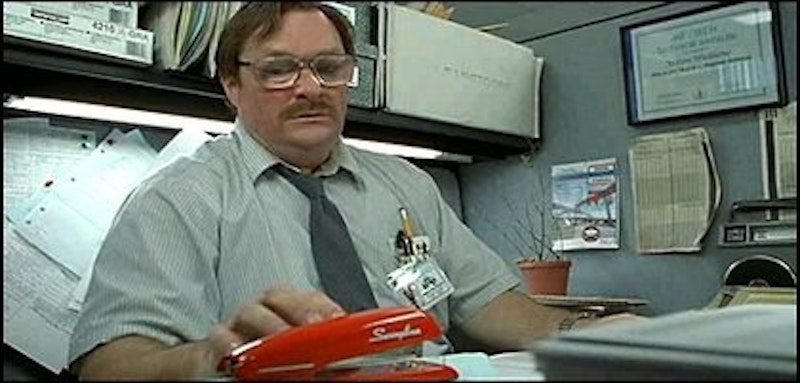After attending the “Cult Classic” free film festival last week, some friends and I were back for more girls’ night out fun. This week’s film: 1999’s Office Space, written and directed by Mike Judge (who also stars in the film as Jennifer “Joanna” Aniston’s boss at Chotchkie’s). The film, about a dysfunctional yet relatable office environment at a software company, received little attention upon its release, but had what many consider a cult following thereafter.
When the movie theater tech guy who apparently chose the series’ films introduced Office Space prior to running it, he asked the audience whether we thought it was a film that fit the “Cult Classic” description; he’d been told by some people it “wasn’t a big enough deal of a film.” The theater, half full (not bad for Sunday night at 10 p.m.), enthusiastically responded positively that the movie has indeed achieved both cult and classic status.
Let’s take a look at some of the reasons why.
Staplers: The film is based on a series of short animated films called “Milton” by Mike Judge. The Milton character appears in Judge’s script as a quirky character who mumbles all the time, was actually laid off years before by the company but has mistakenly been receiving paychecks. Often threatening to burn down the building under his breath, Milton is protective of his red Swingline stapler; an item that was painted red for the film because Swingline didn’t make a red stapler. After the film began becoming popular due to cable and DVD release, Swingline began manufacturing a red stapler.
The Man: The movie resonates with anyone who’s ever worked in an office. Cubicle culture, bland co-workers singing “Happy Birthday,” and the receptionists' repetitive answering of office phones permeate the landscape in Office Space. A boss (or five) heckling you about a TPS report, consultants hired for layoffs, and the office fax machine never working properly are all situations familiar in the white-collar world. Gary Cole as oppressive Initech Vice President Bill Lumbergh is satire-perfect as the middle manager ("Yeah, I'm going to need you to go ahead and come in on Saturday.") One reason the film developed a life of its own is how much people can identify with the script and characters. The artistic, hilarious scene in which hard-core rap is played while the office workers beat up the annoying fax machine with baseball bats and bare fists is probably the most symbolic and memorable in the movie.
Flair: Jennifer Aniston’s character Joanna works at a restaurant called Chotchkie’s. It’s a clear copycat of the real restaurant TGIFriday’s (we even hear the words “Thank God it’s Friday” in a restaurant scene in the film), right down to the random items hanging on walls and the wait staff’s suspenders, covered in buttons. The number of pieces of flair worn versus required is often discussed and a source of stress for Aniston, who ends off flipping off her boss as a result. The film’s main character Peter Gibbons (played brilliantly by Ron Livingston) at one point tells her, “You know, the Nazis had pieces of flair that they made the Jews wear.”
“O Face” Factor: It’s only a small part, but Greg Pitts as Drew telling his co-workers, “I'm thinking about taking that new chick from Logistics. If things go right I might be showing her my O-face. You know: Oh! Oh!” is one of many hilarious moments in the film. Small characters who don’t have many lines (Peter’s next-door neighbor Lawrence, the two “Bob” consultants, Brian the Chotchkie’s co-worker, Nina and her "somebody's got a case of the Mondays") make brief yet meaningfully funny appearances. Peter’s office mates Michael and Samir are excellent characters. Just like in The Breakfast Club, the strength of the movie lies in the writing. (An early shot in the movie reveals the name of the main character’s apartment complex: “Morningwood Apartments.”)
Transformation: In every good script, the hero experiences obstacles and overcomes them to learn important life lessons. No shortage of that here, and the journey is fun to watch. Livingston’s Peter is Everyman—doesn’t love his job, puttering along through life. His occupational hypnotherapist dies in the middle of Peter’s hypnosis, leaving him in a state of bliss that leads to cleaning fresh fish on his desk, playing Tetris, and taking a drill to remove the symbolic cubicle walls and allow a view of the outside. Some of the most famous movie lines also result: when asked about missing work, he slyly points out “I wouldn’t say I’ve been missing it, Bob,” and for my money, the movie’s best line: “It’s not that I’m lazy, it’s just that I don’t care." How the movie’s conflict—fractions of pennies laundered through a software virus—is resolved shows the humanity and sheer luck we all aspire to and hope for in life.

